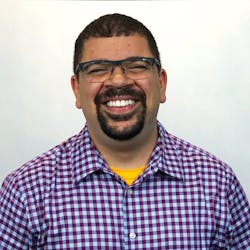Volunteering abroad, AeroPro performs inside and outside the dental office.
Author: Daniel Lopez
Volunteering abroad is my greatest passion in life. Growing up, I never thought I would be able to travel the world, let alone have the immersive experience of serving people in need in another country. Dentistry has given me so many opportunities that I could not have expected, and I am always eager to invite people to share these experiences with me.
This recent trip to Costa Rica was quite a different experience for me and my partner in crime, Michelle Strange. Normally, we are accustomed to operating in very limited space at a remote site along with everyone else in our medical group. Privacy is non-existent, electric power is only an occasional delight, and hot and humid weather is ever-present. This time, however, we were primarily stationed in a functioning general clinic that had two fully functional dental chairs. This was a complete game changer for us as we were now able to deliver higher quality treatment with all the tools necessary at our disposal.
We have always placed an emphasis on providing oral health education to the people we see, so that they cannot only maintain their health but also and spread information and strategies to promote oral health to their families and throughout the community. This means that sometimes you are forced to step out of your comfort zone and think critically about how people can best help themselves; especially with the tools and resources they have available to them. Thankfully, Costa Rica has widespread availability of most dental products, people just need the instruction on how to utilize them properly.
Speaking of utilizing equipment properly, I have to say that I underestimated how useful and effective a portable hygiene handpiece could be when working abroad. We were fortunate enough to have a couple of Premier Dental’s AeroPro™ Cordless Handpieces, which we used extensively, especially when we were providing care outside of the clinic. I admit that I was quite skeptical of cordless prophy handpieces at a glance, I didn’t think they would have enough torque to function, or enough charge to last throughout the day. While the AeroPro™ Cordless Handpiece’s prophy cup speed is less than a corded handpiece, the AeroPro™ definitely had enough torque to provide adequate polishing power. For cases with stubborn staining, using a coarser grit paste easily bridged the gap between the available torque of a corded versus the cordless handpiece to deliver the efficacy I desired. There was a definite learning curve in handling the handpiece as it is lighter than you would think, especially lacking the drag and resistance of a cord. After a few uses and adapting to it, I would say the quality of the coronal polish I was able to provide was on par with a corded handpiece.
We often dismiss or underestimate the utility of prophy cup coronal polishing. I often polish prior to scaling a patient, especially in cases with heavy plaque or materia alba. Polishing first removes both biofilm and the thicker layer of pellicle, which makes it considerably easier to remove calculus. Having the option of the AeroPro™ Cordless Handpiece in the field was an incredible benefit, as it helped me to expediently assess my patients’ hard/soft tissue. It also allowed them to enjoy the sensation of polished teeth that were free of extrinsic stain, in some cases, for the first time in their lives. Seeing the reaction of someone who has never felt that simple luxury is a wonderful thing, and it’s something we typically do not place much importance on.
Having this much equipment is not typical of a foot-on-the-ground, traveling dental mission. Sometimes you have to make do with what is available to you, and often the limited time, space and equipment will have you feeling like you cannot do enough. This is true. We cannot work miracles, not when there are so many individuals in need and limited resources to treat them. But the one thing that we can always do and that also may have the most lasting impact is provide oral health education. Education is the most impactful of our talents, and it can have an effect through generations of people. We might not be able to solve everyone’s problems face to face, but we can certainly impart enough useful information about disease control and prevention that we can help more people in the future.
Daniel Lopez is a dental hygienist working in the public health field since graduating in 2012. His clinical experience lies in treating the HIV+ and LGBQT population in New York City, where he works collaboratively with the medical team to provide comprehensive care. In his spare time, Daniel travels abroad to provide dental care and education to people in need through sustained health models. Daniel is dedicated to providing thorough, unbiased care and educating others on treating diverse and vulnerable populations.
